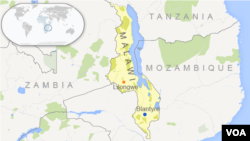Malawians in the country's commercial capital, Blantyre, usually rely on tap water. But for the past five months, the taps have often run dry, forcing residents to draw water from unprotected sources like rivers and wells, while work is being done at the city main pumping station.The risk of contracting water-borne diseases is rising.
In Blantyre and surrounding areas, residents have spent five days without tap water.
Women, who by Malawi tradition are responsible for household tasks, complain of the risks they face when fetching water from rivers far from residential areas.
Rhoda Milanzi, a housewife and mother of three, tells VOA the journeys through bushy footpaths are risky. "We wake up every day 2 a.m., sometimes 1 a.m., to go and collect water. There are so many risks. You see, sometimes we would meet witches, snakes on the way," she says, "even hyenas have been chasing us."
Milanzi says to ease the burden of carrying water home for bathing, women prefer to bathe in the river. But she says they have been disturbed by youths who hide in the nearby bush. "These youths of today would come there and hide somewhere to see us naked. This has been a major embarrassment. In fact we complained to the chiefs about it. They punished some of them, but you know they would sometimes climb trees just to look at older women like us taking a bath," she explains.
The water problem also has affected the delivery of health services. Three weeks ago, authorities at Queen Elizabeth Central Hospital in Blantyre confirmed that they had suspended surgical operations due to water scarcity.
Health rights campaigners warn of the possible outbreak of waterborne diseases, especially in densely populated areas, if the situation is left unresolved.
Officials at the Blantyre Water Board attribute the problem largely to an ongoing European Union-funded project that seeks to install new pumping machines at Walkers Ferry, the main pumping station.
Priscilla Mateyu, the spokesperson for the Blantyre Water Board, says the project is expected to increase water production capacity to 105,000 cubic meters per day from the current daily production of 78,000 cubic meters.
"January is when the project is finishing. But for the new machines and everything else to start working properly, we have to wait until March [2015]. That's when we expect the levels would increase and also production capacity improving to least what we expect it to be," Mateyu said.
The local consumer rights watchdog, the Consumers Association of Malawi, had been planning to hold vigils at the water board until the water supply was normalized, but the board asked protesters to hold off, promising to distribute water to residents through mobile water tanks.
The consumer rights group has given the water board two weeks to fulfill its commitment before proceeding with the protests.




